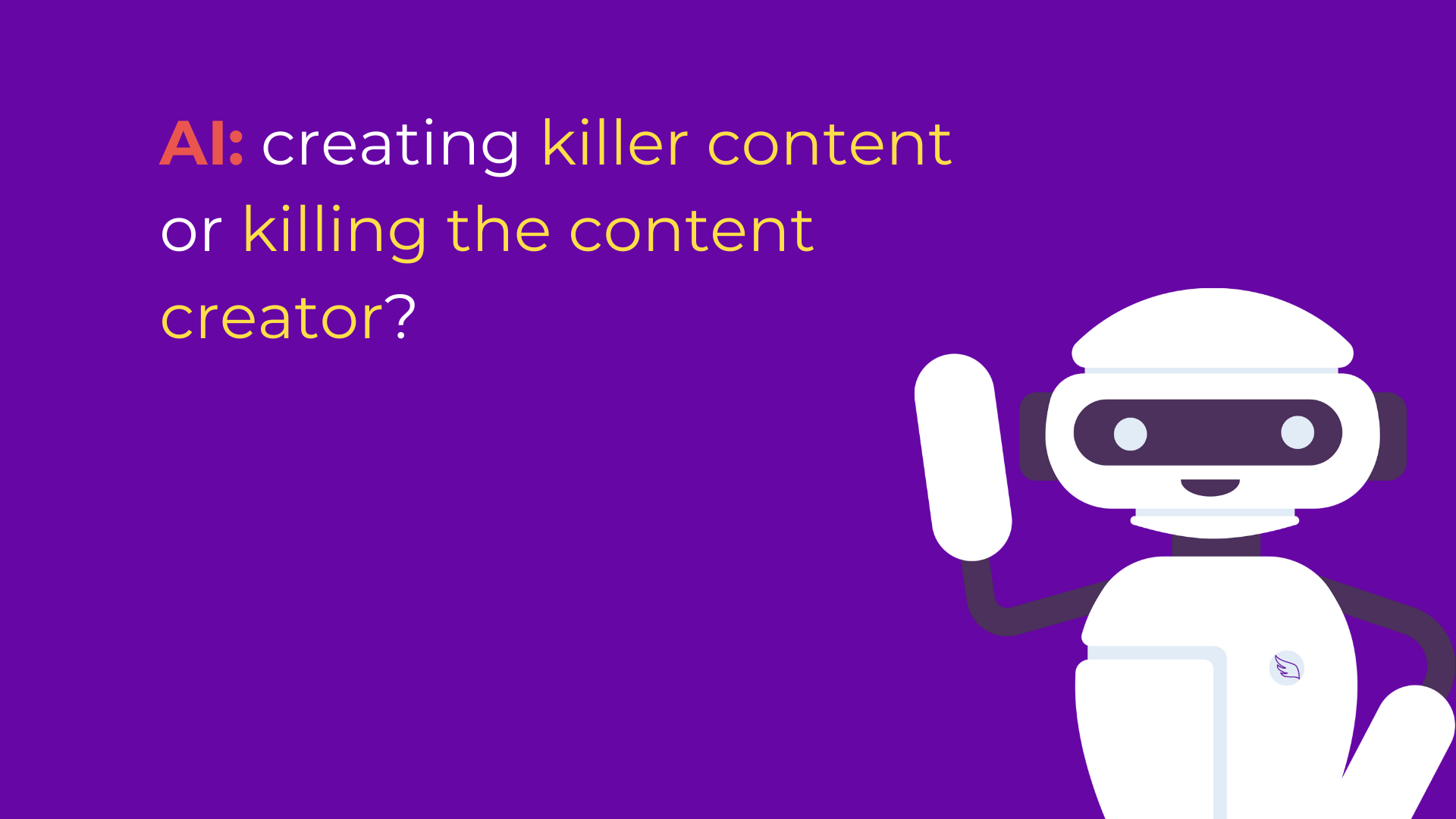
AI: Creating killer content or killing the content creator?
Stone tools were humans’ earliest technology, to the process of shaping rocks, humans fashioned the cool sh*t like axes, hammers, knives, and arrowheads, marking the dawn of the Stone Age!
Since then, significant milestones in technological history have emerged and today the buzzword on everyone’s lips is Artificial Intelligence (AI).
The implementation of AI has transformed various industries all over the world, including content creation. AI offers exciting prospects for generating captivating and compelling content across diverse platforms, including articles, videos, and music at the touch of a button.
Below we explore the potential opportunities for integrating AI into content creation and the advantages it brings to businesses and consumers alike. It’s taking over everything so if you don’t have an idea how to use it to some capacity then you need to get to know.
We think its f**king genius:
AI can generate so many forms of written content, such as articles, blogs, product descriptions, and social media posts.
Its Natural Language Processing (NLP) models, such as GPT-3, are capable of understanding human language and producing coherent and contextually relevant text. This technology enables businesses to automate content creation processes, saving time and effort while maintaining quality.
You can also use AI to rewrite an old piece of copy to quickly repurpose content without using up many resources.
Increased production efficiency: AI can quickly generate large volumes of content, reducing the time required to create engaging written materials.
Content personalisation: AI algorithms can analyse user preferences and behaviour to tailor content to individual needs, resulting in more engaging and relevant experiences.
Multilingual content creation: AI-powered translation models can generate content in multiple languages, enabling businesses to reach a global audience effectively.
Streamlined editing process: AI can even enhance video creation by automating various tasks and improving visual quality.
Video editing software powered by AI algorithms can automatically analyse footage, detect key moments, and create engaging highlights. Additionally, AI can assist in generating special effects, animations, and even deepfake technology for creative storytelling purposes.
AI algorithms can automate mundane video editing tasks, allowing creators to focus on more creative aspects that ai can’t do.
Enhanced visual quality: It can upscale low-resolution footage, enhance image stabilisation, and improve overall video quality, flawlessly.
Collaboration opportunities: AI can assist musicians and composers in the creative process by suggesting melodic ideas, harmonies, and arrangements, fostering collaboration between humans and AI.
Improved user experience: AI algorithms can suggest relevant and engaging content based on user preferences, increasing user satisfaction and engagement.
Enhanced marketing effectiveness: AI-driven content recommendations can be leveraged for targeted advertising, ensuring that the right content reaches the right audience, leading to increased conversions and engagement.
Personalisation: AI analyses user preferences and behaviour, allowing for tailored content experiences that are more relevant and engaging to individual consumers.
Hold the phone, what are the cons?
While AI brings numerous opportunities to the content creation industry and it keeps evolving to get better and better, it also poses risks that need to be carefully considered. Below we highlight just how bad AI can get if we let it:
Threat to Human Creativity: AI-generated content may lack the originality, innovation, and emotional depth that human creativity brings. Over-reliance on AI could lead to a homogenisation of content, stifling diversity and uniqueness.
Ethical Concerns: AI can be used to create deep fakes and manipulate information, raising ethical questions about the authenticity and trustworthiness of content. Misuse of AI in content creation can undermine public trust and contribute to misinformation.
Biased Content: AI algorithms are trained on data that can contain biases present in society. Without careful attention, AI-generated content can perpetuate or amplify these biases, leading to the creation of discriminatory or unfair content.
Quality Control: AI-generated content may lack the ability to fully comprehend contextual nuances, resulting in inaccuracies or misinterpretations. This poses challenges in maintaining high-quality standards and ensuring accurate and reliable content.
Lack of Originality and Creativity: AI-generated content may lack the human touch and originality that comes from genuine human creativity, potentially leading to a homogeneous content landscape.
Ethical Concerns: AI can create deepfake content and manipulate information, raising ethical issues regarding the authenticity and trustworthiness of content.
Potential Bias: AI algorithms may perpetuate biases present in training data, leading to the creation of biased or discriminatory content.
Limited Contextual Understanding: While AI models can generate coherent text and visuals, they may struggle with nuanced contextual understanding, resulting in occasional inaccuracies or misinterpretations.
In conclusion
AI offers vast and diverse opportunities for creating engaging content. By addressing the drawbacks and ensuring responsible and ethical use of AI technologies, content creators can harness the benefits of AI to provide accessible, captivating, and reliable content to audiences. Striking a balance between human creativity and AI capabilities is key to realising the full potential of AI in content creation.
To fully harness the benefits of AI in content creation, it is crucial to address these drawbacks and ensure responsible and ethical use of AI technologies. As with most things in life, I think we need to find balance and moderation. Striking a balance between human creativity and the capabilities of AI can lead to a future where engaging and captivating content is readily accessible to all, freeing up humans for things that machines can’t help with (YET!)
So, what do we really think?
The content creation industry should adopt a balanced approach that values human creativity alongside the capabilities of AI, ensuring that technology serves as a tool to enhance and complement the work of content creators, while upholding ethical standards and delivering engaging, diverse, and reliable content to audiences.
So, whether you’re using AI to help you get creative or a marketing agency for a website build, there’s no shame in not being able to do it all in-house
Next up in our marketing industry updates…. TikTok; what’s it all about?


